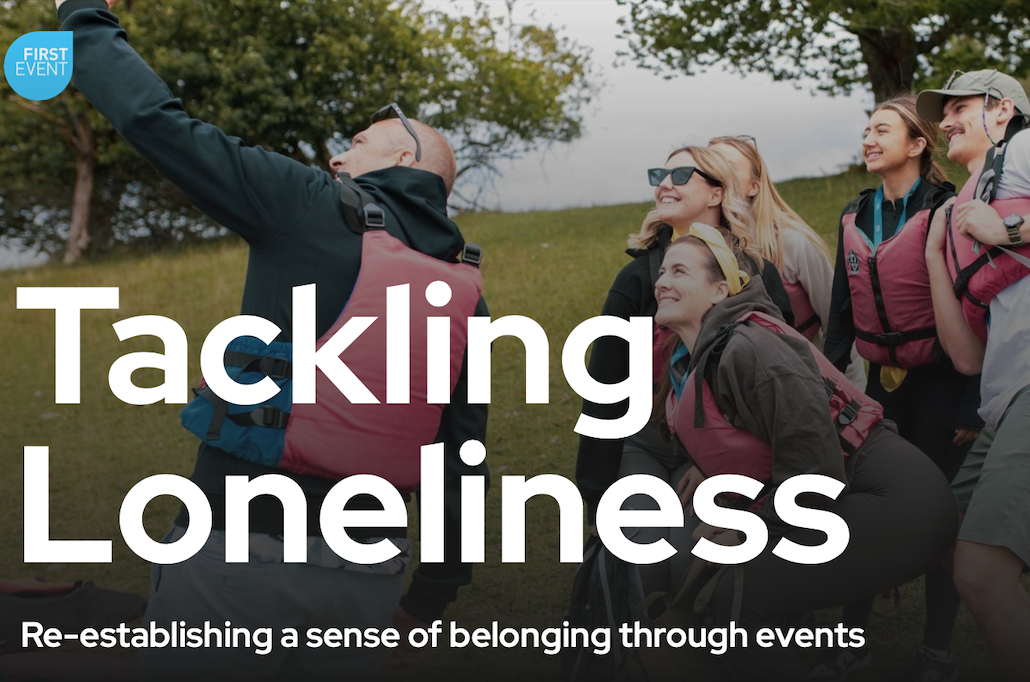At its latest First In event at London’s Grand Connaught Rooms, First Event unveiled its new report Tackling Loneliness: Re-establishing a sense of belonging through events. Hosted by sales director Jake Burnham, the session featured head of marketing Alex Melia and head of tech and innovation Max Collishaw, who discussed how events can play a transformative role in addressing the “loneliness epidemic”.
The report, developed in partnership with Canvas8, highlights sobering statistics: 51% of 18–24-year-olds in the UK workforce say they feel lonely, and nearly one in three adults report loneliness at least sometimes.
On a more positive note, two in five people are actively seeking transformative experiences, and many are willing to pay for events that help build community – great news for the events sector.
The discussion shared a five-step framework for how events can counter loneliness and build a sense of belonging:
1. Build Belonging at a Distance
With hybrid and remote work now the norm, employees often miss out on day-to-day interactions. Events can bridge that gap not just through large-scale gatherings, but also by smaller, localised moments of connection.
As Collishaw explained: “So, you’ve got your calendar events throughout the year. But what are those moments you can create between those events? How can you bring people together and create micro communities in the different areas that your people are based?”
2. Nurture a New Sense of Purpose
Employees want their work to matter. According to the report, 42% of UK workers would take a pay cut for a socially impactful job. Events provide opportunities to bring company values to life and connect people with a bigger mission.
Melia noted that this goes beyond messaging on stage: “If you build a community within your event, then the ROI of that event is going to carry on past that event. You can’t just create a community in one moment, it must be nurtured in between and given opportunities to grow.”
3. Support a Solution for Work-Life Tension
People crave connection but don’t want it to come at the expense of personal time. The report shows that 33% of 18–24-year-olds believe more face-to-face time with colleagues would help them make friends.
Events should respect boundaries by scheduling social opportunities within work hours and weaving in moments for relaxation, rather than forcing networking outside the 9–5.
4. Build Hierarchy-Free Harmony
A lack of trust in leadership is a driver of workplace loneliness. Events are a chance to flatten hierarchies, foster dialogue and make senior leaders more approachable.
Collishaw emphasised the need for thoughtful design: “Nobody wants to feel this is the one time of the year they see the CEO from a distance. It’s about mixing people together in ways they haven’t before, creating safe spaces for conversations that feel authentic.”
5. Create Space for Community to Flourish
Finally, events must leave time for informal, spontaneous connection. Research shows 85% of UK workers believe they perform better when they feel a sense of community. Building agendas that allow people to interact naturally, whether through breakout activities or interest-based groups, can spark friendships and long-term bonds.
Why It Matters
Loneliness isn’t just a personal issue, but a business one: employees who feel a sense of community are almost three times more likely to trust senior management, and 85% of UK workers say they perform better when they feel connected to colleagues. As Burnham summed up, tackling loneliness through events isn’t just about wellbeing, it’s about creating stronger, more engaged communities within and beyond the workplace.

